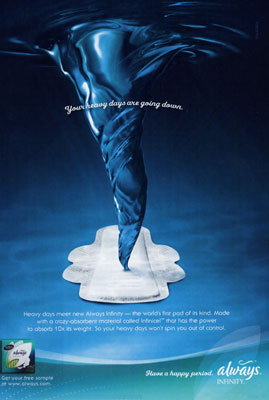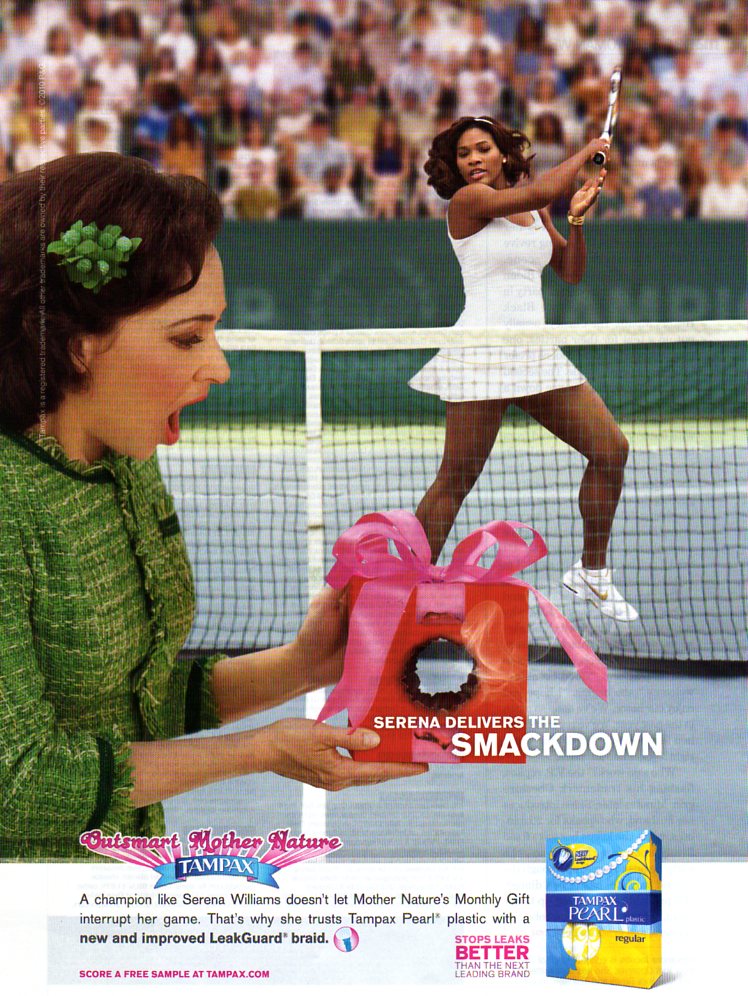
Although we will be focusing primarily on advertisements for tampons, this image seemed particularly appropriate for introducing our topic, Menstruation in Advertising. The image equates menstruation with natural disaster and implies that the only way for women to function during their 'heavy days' is to utilize Always Infinity pads. The Always slogan, "Have a Happy Period," seems to indicate that without Always products women will have an 'unhappy' period, or that the tornado-like symptoms of menstruation will be uncontrollable.
All of the images that follow are advertisements for Tampax brand tampons. The Tampax company is owned by Proctor and Gamble, a multinational corporation and American Fortune 500 company. The corporation owns numerous brands including Tampax, Always, Secret, Venus, and Old Spice and many others. These advertisements represent a modern shift in attitudes regarding menstruation, and are considered to be an empowering approach to the physicality of women's health. On the surface this may be true: these images represent powerful women, humorous women and 'women in charge,' but the images still contain undercurrents of sexism and attitudes more consistent with the historical notions of shame and cleanliness associated with menstruation and female bodies. Although the ads move away from the stereotypical images of women riding horses on the beach, turning cartwheels or going dancing, celebrating their periods as an invigorating or joyful experience, they still communicate notions of shame and the need to accommodate male needs and comfort during menstruation. One could argue that this subversion of more obvious sexism in advertisements for female sanitary supplies actually creates a more subtle and damaging message regarding the meaning of femininity or what it means to be female. These ads continue to perpetuate the idea that women's bodies are not their own during menstruation; the concept of menstruation as some sort of attack (or 'gift') necessarily separates the female from her body. The female body becomes a site for cultural examination or imposition of cultural conceptions of femininity.
A Physical Attack on Mother Nature: Fight the 'Gift'

This image presents the period as an unwelcome 'gift' given by Mother
Nature. The two women portrayed in the advertisement are presented very
differently based on the roles they are fulfilling: Mother Nature is a
middle-aged woman, wearing a green (natural, of course!) suit with a
cute hair clip; she is a typically feminine matriarch-type character,
exuding comfort and predictability in her fulfillment of gender
stereotypes. Serena Williams, on the other hand, is a pro athlete with
the power to give Mother Nature "the smackdown."
She is in an active position, taking an aggressive stance towards Mother Nature's 'gift,' which she not only rejects, she attacks! Mother Nature is passive, holding the gift and looking shocked, maintaining her position as the 'feminine' woman, while Serena embodies a graceful, powerful woman who can wear white and be a professional athlete during her period because she has 'outsmarted Mother Nature' and rejected her monthly 'gift.' This advertisement portrays menstruation as an enemy to be conquered, militarizing the period and obligating women to 'combat' the unwelcome monthly 'gift.' Conversely, the specific brand of Tampax is called Pearl, indicating that while Serena and other women who choose to use Tampax Pearl tampons are tough and unrelenting on Mother Nature's intrusion, they are also feminine and delicate, like Mother Nature herself (as depicted in the advertisement).
This advertisement maintains the divergent nature of women's societal obligations: women must be unaffected by menstruation and maintain all of their abilities, including their toughness and power, but also their femininity. This New York Times Article from March 2009 discusses the new advertising campaign, designed by Leo Burnett Worldwide, and its departure from the typical tampon ads that historically have not contained any elements of humor. The article describes Mother Nature as a 'mother-in-law' type character, and praises the ad campaign for its humor and frankness.
She is in an active position, taking an aggressive stance towards Mother Nature's 'gift,' which she not only rejects, she attacks! Mother Nature is passive, holding the gift and looking shocked, maintaining her position as the 'feminine' woman, while Serena embodies a graceful, powerful woman who can wear white and be a professional athlete during her period because she has 'outsmarted Mother Nature' and rejected her monthly 'gift.' This advertisement portrays menstruation as an enemy to be conquered, militarizing the period and obligating women to 'combat' the unwelcome monthly 'gift.' Conversely, the specific brand of Tampax is called Pearl, indicating that while Serena and other women who choose to use Tampax Pearl tampons are tough and unrelenting on Mother Nature's intrusion, they are also feminine and delicate, like Mother Nature herself (as depicted in the advertisement).
This advertisement maintains the divergent nature of women's societal obligations: women must be unaffected by menstruation and maintain all of their abilities, including their toughness and power, but also their femininity. This New York Times Article from March 2009 discusses the new advertising campaign, designed by Leo Burnett Worldwide, and its departure from the typical tampon ads that historically have not contained any elements of humor. The article describes Mother Nature as a 'mother-in-law' type character, and praises the ad campaign for its humor and frankness.
Oops! Relating Social Embarrassment and Menstrual Shame for Teens

In 2006, the "Embarrassment Happens. Leaks Shouldn't" add campaign won
a bronze Effie Award in recognition of its overall effectiveness.
The campaign advertises Tampax Pearl of the Procter & Gamble
company through Leo Burnett USA. Effie Worldwide's
website notes that the campaign's creative strategy "linked Pearl's
protection with the most relevant emotional benefit for young women--
no embarrassing links in public." The site goes on to note that
this add campaign pushed the Tampax brand to over 50% value share of
the total tampon company.
Considering the magazines that run Tampax Pearl ads, as well as the use of the product advertised, the target of this add campaign is most likely teenage girls in the United States. Focusing on the specific ad chosen from this campaign, the ad's focal point is a girl/young woman whose bikini top has fallen off in the pool. Her downward gaze, slightly parted mouth, and hands that appear to be attempting to cover her breasts indicate felt embarrassment.
The background of the ad reveals an active, moving pool front atmosphere. The inner tube suggests a family friendly environment where the subject of the ad would most likely not want to be seen topless. Furthermore, the images of individuals directly in front of the subject may be assumed to be older and male; the generational gap is indicated by the white speedo worn by one man and the more relaxed, masculine ways that the individuals are standing or sitting. This background may help to show the subject as identifying with a new, younger generation and the older males and family friendly setting may help to insure this identification.
The viewer is positioned from within the pool, either as accompanying the subject of the ad, perhaps as a friend, or is meant to feel as if she is the subject. If the target audience is teenage girls, this ad presents a situation imagined, if not actually experienced by many by many in the target audience. This helps the target audience identify both against generations and with each other based on similar dreaded embarrassment. Taking into account the item being advertised, tampons, this advertised identification with other young women is extremely important; given that many of the magazines that this ad would run in actually provide space for girls to relate and commiserate of embarrassing moments, the use of the possibility of embarrassment seems to be an extremely effective unifier. The use of tampons, in modern US culture, is associated with great amounts of shame and embarrassment; this embarrassment and shame increases when the possibility of revealing oneself as menstruating around groups that would not understand (older men, children) comes into play. Thus, the embarrassment revealed in this ad relates everyday embarrassment possibly faced by young women with the connected assumed embarrassment of menstruation; in promising to correct any embarrassment resulting from uncontrolled menstruation, the add company leaves the other embarrassments as possible and uses them as unifiers of a generation.
It is also important to note the race (white) of the subject, as well as the surrounding "country club" atmosphere suggesting a more middle/upper class target audience. This may be attributed to the cost of Tampax Pearl, or an attempt to present tampons as classier, as hinted at by "Pearle".
Considering the magazines that run Tampax Pearl ads, as well as the use of the product advertised, the target of this add campaign is most likely teenage girls in the United States. Focusing on the specific ad chosen from this campaign, the ad's focal point is a girl/young woman whose bikini top has fallen off in the pool. Her downward gaze, slightly parted mouth, and hands that appear to be attempting to cover her breasts indicate felt embarrassment.
The background of the ad reveals an active, moving pool front atmosphere. The inner tube suggests a family friendly environment where the subject of the ad would most likely not want to be seen topless. Furthermore, the images of individuals directly in front of the subject may be assumed to be older and male; the generational gap is indicated by the white speedo worn by one man and the more relaxed, masculine ways that the individuals are standing or sitting. This background may help to show the subject as identifying with a new, younger generation and the older males and family friendly setting may help to insure this identification.
The viewer is positioned from within the pool, either as accompanying the subject of the ad, perhaps as a friend, or is meant to feel as if she is the subject. If the target audience is teenage girls, this ad presents a situation imagined, if not actually experienced by many by many in the target audience. This helps the target audience identify both against generations and with each other based on similar dreaded embarrassment. Taking into account the item being advertised, tampons, this advertised identification with other young women is extremely important; given that many of the magazines that this ad would run in actually provide space for girls to relate and commiserate of embarrassing moments, the use of the possibility of embarrassment seems to be an extremely effective unifier. The use of tampons, in modern US culture, is associated with great amounts of shame and embarrassment; this embarrassment and shame increases when the possibility of revealing oneself as menstruating around groups that would not understand (older men, children) comes into play. Thus, the embarrassment revealed in this ad relates everyday embarrassment possibly faced by young women with the connected assumed embarrassment of menstruation; in promising to correct any embarrassment resulting from uncontrolled menstruation, the add company leaves the other embarrassments as possible and uses them as unifiers of a generation.
It is also important to note the race (white) of the subject, as well as the surrounding "country club" atmosphere suggesting a more middle/upper class target audience. This may be attributed to the cost of Tampax Pearl, or an attempt to present tampons as classier, as hinted at by "Pearle".
The Period as an Obstacle: Sex During Menstruation

Tampax is a well-known company for feminine products. This ad, printed
in February 2011, is one of a series by Leo Burnett, an advertising
executive also behind such big names as the Jolly Green Giant, the
Marlboro Man, and Toucan Sam. Both the Jolly Green Giant and the
Marlboro Man have very sexualized undertones representing idealized
masculinity--the Giant is strong, towering over lesser men as a 55 ft
statue in a town in Minnesota, and the Marlboro Man is the epitome of
the romantic cowboy figure, both rugged and handsome.
The character of the manly-man is carried out in this Tampax advertisement. The room is decked out with everything required for a romantic Valentine's Day--dark red sheets, roses, chocolate, mood lighting, and a heavenly man in white. The man's white suit dominates the center of the frame, and the shaft (pun intended) of light that shines through the window on him further emphasizes his purity. His white stands in stark contrast to Mother Nature storming outside the window, dark red clouds pierced with his white sunbeam. Even his position, center of the photo, legs and arms spread to take up maximal space, is clearly designed to cast him as the strong hero of the picture. It is the old Culture versus Nature dichotomy--the man is cultured, fancily clad, economically independent, and sexually experienced. The woman, on the other hand, is stormy, moody, susceptible to flowers and chocolate, and meant to be submissive to the man's will.
Placing the man at the center of the ad completely changes the marketing focus of the advertisement. Instead of simply framing tampons as a product to reduce discomfort for women, the presence of the man and the text "Mother Nature please, the room is already paid for," are selling the idealized male. Valentine's day comes with the expectation of sex for the man, and the woman's period is a hassle and even an economic hardship for him. But if menstruation cannot be thwarted completely, at least it can be tricked into submission, 'outsmarted' through masculine wiles.
It is interesting to note that the woman, the ultimate consumer of the product, is completely absent in the photo. We see the gifts that are symbols of the man's economic power, and the storm of disaster that represents the woman's natural body, yet we are not given her physical form. Why would an advertisement for a product designed for use by females completely exclude them from the ad? Tampax relies on the oversexed manly-man to legitimize male authority over female bodies. If men really are the ones in charge of women's bodies, men are the ones who need to be convinced by the ad. Once men are convinced Tampax will help them "outsmart mother nature" and reassert their sexual prowess, they will use their social and economic power to convince women to purchase Tampax. The cycle of male domination of female bodies continues, disguised as a Valentine's Day gift and a box of chocolates.
The character of the manly-man is carried out in this Tampax advertisement. The room is decked out with everything required for a romantic Valentine's Day--dark red sheets, roses, chocolate, mood lighting, and a heavenly man in white. The man's white suit dominates the center of the frame, and the shaft (pun intended) of light that shines through the window on him further emphasizes his purity. His white stands in stark contrast to Mother Nature storming outside the window, dark red clouds pierced with his white sunbeam. Even his position, center of the photo, legs and arms spread to take up maximal space, is clearly designed to cast him as the strong hero of the picture. It is the old Culture versus Nature dichotomy--the man is cultured, fancily clad, economically independent, and sexually experienced. The woman, on the other hand, is stormy, moody, susceptible to flowers and chocolate, and meant to be submissive to the man's will.
Placing the man at the center of the ad completely changes the marketing focus of the advertisement. Instead of simply framing tampons as a product to reduce discomfort for women, the presence of the man and the text "Mother Nature please, the room is already paid for," are selling the idealized male. Valentine's day comes with the expectation of sex for the man, and the woman's period is a hassle and even an economic hardship for him. But if menstruation cannot be thwarted completely, at least it can be tricked into submission, 'outsmarted' through masculine wiles.
It is interesting to note that the woman, the ultimate consumer of the product, is completely absent in the photo. We see the gifts that are symbols of the man's economic power, and the storm of disaster that represents the woman's natural body, yet we are not given her physical form. Why would an advertisement for a product designed for use by females completely exclude them from the ad? Tampax relies on the oversexed manly-man to legitimize male authority over female bodies. If men really are the ones in charge of women's bodies, men are the ones who need to be convinced by the ad. Once men are convinced Tampax will help them "outsmart mother nature" and reassert their sexual prowess, they will use their social and economic power to convince women to purchase Tampax. The cycle of male domination of female bodies continues, disguised as a Valentine's Day gift and a box of chocolates.